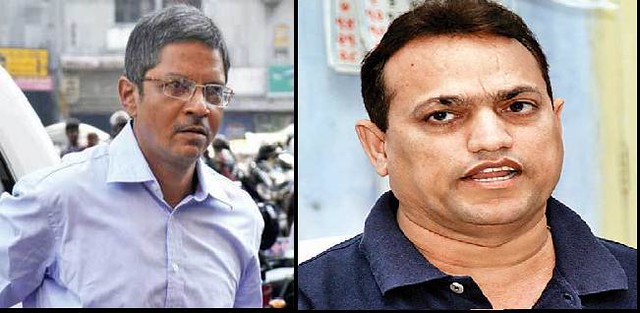By reinstating cops accused of fake encounters Gujarat Government is putting them in the same machinery which is prosecuting them. They can consequently threaten or cajole witnesses, believe Legal Experts.
By TwoCircles.net Special Correspondent,
“On availing the bail, the respective applicants shall not directly or indirectly make an inducement, threat or promise to any person acquainted with the facts of the case so as to dissuade him to disclose such facts to the Court or to any other authority”, said Bombay High Court while granting bail to IPS officer Abhay Chudasama and two others in the 2005 fake encounter case of Sohrabuddin. The order was pronounced on 28th April 2014 by Bombay High Court Justice A R Joshi.
Such caution by the high court in Chudasama’s case was not exception but the usual practice of court of law forewarning accused granted bail by the court with the intention that although court is releasing accused from prison but allegations against him still hold till judged ultimately by the trial court.

G L Singhal and Abhay Chudasama
Because of this after releasing on bail he must remain away from everything which comes under the domain of evidence against him so that ‘his personal liberty’ granted by court should not influence or tamper any material evidence of the case nor even because of his simple physical presence.
Such admonition by court at the end of its order is not mere ceremonial but is inclusive in nature, violation of which may result into cancellation of bail by the court when such infringement is brought to its notice through a separate urging.
Two bright IPS officers of Gujarat viz. G L Singhal and Abhay Chudasama were charged by central investigating agency CBI with the criminal offences related to fake encounters of Ishrat Jahan (2004) and Sohrabuddin (2005) respectively and who have been released on bail after spending couple of years behind bars under such allegations, have assumed their positions in the Gujarat police force recently.
While G L Singhal has been reinstated to the position of Group Commandant in the State Reserve Police (SRP) on 28th May 2014, Abhay Chudasma has been made the Superintendent of Police (SP) of Vigilance Squad in the DGP’s office, Gandhinagar with the notification issued on the night of 14th Aug 2014. This means that Chudasama will have special powers with his posting to conduct raids anywhere in Gujarat state to curb crimes.
Both these officers were earlier suspended by Gujarat government following their arrests but their reinstatement soon after the grant of bail raises a few unanswered questions for the Anandi Ben led BJP government in Gujarat.
The foremost and utmost important question having legal implications is that reinstating such tainted officers, who have not yet been cleared from criminal charges, to an elite post in the state police force offering wide range of powers of summoning any person in the state or sanctioning prosecution against any accused person in the state can certainly influence the witnesses – many of whom are their subordinate police personnel. Who will assure that the witnesses against them in their own criminal cases will not be influenced or that prosecution evidences against them will not be hampered in any way due to their reinstatement?
Experts’ Opinions: Advocate Vrinda Grover, a Supreme Court lawyer who is representing Ishrat Jahan mother Shamima Kausar in the fake encounter trial, told TwoCircles.net, “There is a fundamental principle that when a case is going on against somebody, that person is asked to step down from their position, (but) here the reverse is happening,” adding that you are putting them in the same machinery which is prosecuting them.
She further pointed out that in the Ishrat Jahan case the witnesses are the subordinate police officers and the persons reinstated are now going to be their boss and they will be expected to go and give evidences against their boss, and wondered if ever it can happen in India.
Talking to TCN, Social Activist Tessta Setalvad too described the reinstatement as “very unfortunate” and “shocking,” adding, “The power that a police officer has in the hierarchy is very strong, and you have the same dispensation in power – if not the same person – and it would be very short sighted view to say that they would not influence (the witnesses).”
Gujarat based Advocate Gagan Sethi of the Centre for Social Justice (CSJ) said that these officers have only been released on bail and therefore there is nothing which can suggest that they are free of their guilt.
“Bail as a right is available to all accused and that doesn’t minimize the gravity of the charge or the likelihood of a person being guilty or not”, Advocate Sethi told TwoCircles.net.
In an Email response to TCN, he further said, “Utmost caution needs to be exercised in reinstating such officers to duty; ideally they should be asked to proceed on leave or given postings where they cannot influence the outcome of trial, influence witnesses.”
In the eyes of law any crime committed within the territory of a state is supposed to have been committed against the state. Therefor the fake encounters in which these two IPS officers have already been charged by the CBI should be considered to have been committed against state. Gujarat government should have ideally acted as a prosecution against these officers. But the state government has maintained that these encounters were genuine and that those killed had terror links.
“Being put on posts which they can use to threaten or cajole witnesses, is a clear indication that the administration is helping them,” Sethi further told TCN. He feels that the matters should not be taken lightly and must be brought to the notice of the National Human Rights Commission (NHRC).

